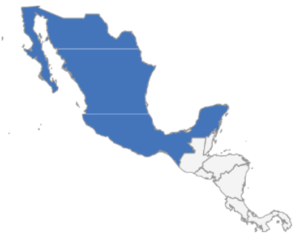Mexico
Has been a member of CATIE since 1995, but even before that date, CATIE has developed actions in the country to provide a timely, coherent and innovative response to demands and needs at different levels.

Research and development
Relevant CATIE projects or actions in Mexico
Biodiversity and sustainable agrosilvopastoral livestock landscapes (BioPaSOS): Promotes climate-smart and biodiversity-friendly agrosilvopastoral approaches among livestock producers in three pilot areas of Campeche, Chiapas, and Jalisco. It considers interventions at the farm level, which have been scaled up to the local and state scale to reduce negative impacts on biodiversity. It works with a focus on livestock value chains, in alliance with actors from the public and private sector, academia and other partners, to support decision-making and generate differentiated products (CATIE with listed partners: http://www.biopasos.com, support from IICA-AGROINNOVA and financing from IKI/BMU of Germany).
Development and adoption of technologies linked to the MRV system for REDD+ and the National Forest Monitoring System: CATIE collaborates in strengthening capacities in forest carbon accounting and INGEI through the development of graphical interfaces to consolidate the INFyS database and to reinforce the institutionalization and use of the MAD-Mex software (CATIE supports CONAFOR's Activity Data Monitoring for Mexico).
Ecological Restoration of Mangroves and its Impact on Carbon Capture and Emission: Develops standardized principles and methodologies for ecological restoration of mangroves for Mesoamerica and the Dominican Republic. It also seeks that blue carbon accounting be incorporated into the commitments of the NDC and the accounting of the INGEI (CATIE/CINVESTAV/UNAM).
Cocoa germplasm exchange: Is a collaboration with the Rosario Izapa Experimental Field of the National Institute of Forestry, Agricultural and Livestock Research (INIFAP) to share genetic material available in the cocoa banks of both institutions.
Offer of value for the country
CATIE can support the country in the following areas: knowledge management, human resource training, rural development, rural extension, family farming, food and nutritional security, agroecology, agroforestry systems with coffee and cocoa, sustainable intensification of the livestock, sustainable forest management, adaptation / mitigation of climate change, water security and information platforms for a comprehensive territorial approach, among others.
Capacity Building
Graduate Training
- Since its creation in 1944: 227 graduates to date (69 women and 158 men)
- Currently eight students (3 women and 5 men)
From 2014 to date
- 713 professionals and technicians trained (289 women and 424 men)
- 2852 families trained
- 600 volunteer livestock promoters trained
- Three interns (1 doctoral and 2 undergraduate)
Strategic partners
The impact of our actions is enhanced thanks to an extensive network of partners from various sectors. Since it began activities in Mexico, CATIE has formed strategic alliances with various partners, both from the public and private sectors, as well as local governments, academia, international cooperation, non-governmental organizations, community groups, rural producers, and their organizations. In the last two years, agreements have been signed with the Universidad Juárez Autónoma de Tabasco (UJAT), the Secretariat of Agriculture, Livestock and Fisheries (SAGyP) and the Secretariat of Environment and Natural History (SEMAHN) of Chiapas, the University of Guadalajara (UDG) Jalisco and the Secretariat for Gender Equality (SEIGEN) of the State of Chiapas.
More information:
Claudia J. Sepúlveda L. CATIE Liaison in Mexico csepul@catie.ac.cr
